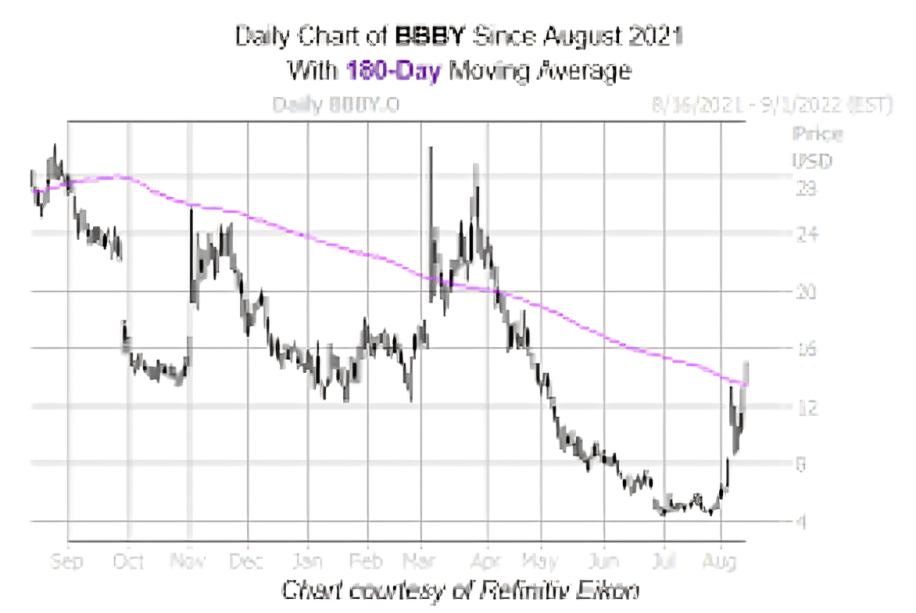Finance
Unlocking the Potential: Guide to BBBY Stock

Stock market investments, particularly in companies like BBBY, necessitate thorough research and analysis. To better equip you as an investor, we will explore the intricacies of BBBY stock in this book, offering insightful commentary, professional viewpoints, and answers to frequently asked questions.
Understanding BBBY Stock
What Sets BBBY Stock Apart?
Due to its distinct market position, BBBY stock frequently captivates investors. In this section, we will take a closer look at what makes BBBY unique, which will help you understand its growth and stability prospects.
The Historical Performance of BBBY Stock
Investigate the BBBY stock performance history, looking at how it has changed over time. Making educated guesses regarding the future course of BBBY stock requires an understanding of the historical background.
Key Financial Indicators for BBBY Stock
A thorough evaluation of BBBY stock can help you navigate the murky waters of financial indicators. Investigate key indicators that reveal the financial well-being and the dangers of investing in BBBY.
Navigating Market Trends with BBBY Stock
Current Market Trends and BBBY Stock
Investigate the present market tendencies impacting BBBY stock to be ahead of the curve. Learn more about the market’s external forces and how they affect BBBY stock performance.
Expert Analysis: BBBY Stock Projections
Profit from professional predictions on the future of BBBY stock with the help of this analysis. Experts in the field weigh in, painting a complete picture of the opportunities and threats that BBBY might encounter in the years to come.
Strategic Investment Tips for BBBY Stock
This section provides strategic advice and things to think about when dealing with BBBY stock for investors who want to maximize their portfolio. Get the most out of your BBBY investment by learning the ins and outs, including entry points and exit methods.
BBBY Stock: Addressing Common Concerns
Is BBBY Stock a Risky Investment?
Any investor worth their salt will address risk concerns. Make well-informed decisions that are in line with your risk tolerance by analyzing the potential dangers of BBBY stock.
How Does BBBY Stock Compare to Competitors?
Invest in BBBY stock to explore dividends. Learn about the dividend policies, how often they are paid out, and the possible returns on your investment in BBBY. This will help you understand how to generate income from your money.
FAQs – Your Burning Questions Answered
Is Now a Good Time to Invest in BBBY Stock?
Find out if now is a good time to buy BBBY stock by looking at the market conditions and the thoughts of experts.
How Does BBBY Stock Compare to Competitors?
Investigate BBBY’s market position in depth by learning how it stacks up against its rivals.
What Factors Influence BBBY Stock Prices?
Get a feel for what drives BBBY stock prices so you can make educated investment choices.
Can BBBY Stock Weather Economic Downturns?
Find out how BBBY handles tough market conditions by looking into how it handles economic downturns.
What Is the Long-Term Outlook for BBBY Stock?
Learn how to connect your investing goals with anticipated future trends by looking into the crystal ball with expert forecasts on the long-term outlook for BBBY stock.
How Does BBBY Stock Contribute to a Diversified Portfolio?
Learn how BBBY stock fits into a diverse investing portfolio and how it can help you strike a balance between risk and profit.
Conclusion:
Finally, for individuals prepared to wade through its intricacies, BBBY stock presents a one-of-a-kind investing opportunity. You can make educated decisions that are in line with your financial objectives when you have insights, past data, and expert opinions at your disposal.
Finance
Common Misconceptions About Financial Literacy Debunked

Introduction to Financial Literacy and its Importance
Are you ready to take control of your financial future? Financial literacy is a crucial skill that everyone should strive to master, regardless of their income or background. In this blog post, we will debunk common misconceptions surrounding financial literacy and show you why it’s essential for building a secure and prosperous tomorrow. So grab a cup of coffee, sit back, and let’s dive into the world of financial empowerment together!
Debunking the Myth: Financial Literacy is Only for Rich People
Have you ever heard the misconception that financial literacy is only meant for the wealthy elite? Let’s debunk this myth once and for all. Financial literacy is not about how much money you have in your bank account; it’s about understanding basic concepts that can help you make informed decisions about your finances.
Whether you’re a recent college graduate starting out or someone nearing retirement, having a good grasp of financial literacy is essential. It empowers individuals from all walks of life to take control of their money and work towards their financial goals.
Learning about managing debt, budgeting effectively, and investing wisely are key aspects of financial literacy that benefit everyone, regardless of income level. By educating yourself on these topics, you can build a solid foundation for a secure financial future.
Don’t let the misconception that financial literacy is only for the rich hold you back. Take charge of your finances today and start on the path towards greater stability and success.
Understanding Financial Terms and Concepts
Navigating the world of finance can often feel like deciphering a foreign language, with terms like APR, ROI, and diversification causing confusion. Understanding these financial terms and concepts is essential for anyone looking to improve their financial literacy.
APR stands for Annual Percentage Rate, which represents the annual cost of borrowing money. It’s crucial to know this when taking out loans or using credit cards to avoid paying more than necessary in interest fees.
ROI, or Return on Investment, measures the profitability of an investment relative to its cost. Knowing how to calculate ROI can help individuals make informed decisions about where to allocate their money for optimal returns.
Diversification involves spreading investments across different asset classes to reduce risk. By diversifying your portfolio, you can mitigate potential losses while potentially increasing overall returns.
By familiarizing yourself with these fundamental financial terms and concepts, you’ll be better equipped to make smart financial decisions that align with your long-term goals and aspirations.
Breaking Down Complex Investment Strategies
Navigating the world of investments can seem daunting, with complex strategies and jargon that may intimidate beginners. However, understanding these strategies is crucial for anyone looking to build wealth and secure their financial future.
One common misconception is that investment strategies are only for financial experts or wealthy individuals. In reality, with the right knowledge and guidance, anyone can learn to navigate the stock market and make informed decisions about their money.
Diversification is a key concept in investment strategy – spreading your investments across different asset classes helps reduce risk. This means not putting all your eggs in one basket but rather creating a balanced portfolio that can weather market fluctuations.
Another important aspect is understanding risk tolerance – how much volatility you’re comfortable with in your investments. It’s essential to assess your own risk appetite before diving into any investment strategy to ensure it aligns with your long-term goals.
Breaking down complex investment strategies involves patience, education, and seeking professional advice when needed. By taking the time to learn about different investment options and staying informed about market trends, you can confidently navigate the world of investing.
The Role of Credit Scores and How to Improve Them
Understanding the role of credit scores is essential in achieving financial stability. Your credit score reflects your financial health and impacts your ability to borrow money, secure a loan, or even rent an apartment.
To improve your credit score, start by checking it regularly for any errors or discrepancies. Paying bills on time and reducing debt can positively influence your score over time. Avoid opening multiple new accounts at once as this can signal financial instability to lenders.
Maintaining a low credit utilization ratio by keeping balances below 30% of your available credit limit is key. Consistently monitoring your credit report and addressing any issues promptly can help you stay on top of maintaining a healthy credit score.
Prioritizing good financial habits like responsible borrowing and timely payments will ultimately lead to an improved credit standing.
Creating a Budget Plan: Tips and Tricks
Creating a budget plan may seem daunting, but it’s essential for managing your finances effectively. Start by tracking your expenses to understand where your money is going each month. This will help you identify areas where you can cut back and save.
Set clear financial goals to stay motivated and focused on your budgeting journey. Whether it’s saving for a vacation or paying off debt, having specific objectives will keep you accountable.
Don’t forget to include both fixed expenses like rent and utilities, as well as variable costs such as groceries and entertainment in your budget. This comprehensive approach ensures that no expense is overlooked.
Consider using budgeting apps or spreadsheets to streamline the process and track your progress easily. Automation can also help with setting aside savings or paying bills on time without fail.
Adjust your budget regularly based on changing circumstances like income fluctuations or unexpected expenses. Flexibility is key to maintaining a realistic and sustainable financial plan.
The Difference Between Good Debt and Bad Debt
Understanding the difference between good debt and bad debt is crucial when it comes to financial literacy. Good debt can be seen as an investment in your future, like taking out a mortgage to buy a home or student loans to further your education. These types of debts have the potential to increase your net worth over time.
On the other hand, bad debt typically refers to high-interest consumer debts like credit card balances that accumulate interest quickly and do not provide any long-term benefits. Falling into the trap of bad debt can hinder your financial progress and lead to a cycle of never-ending payments.
It’s important to prioritize paying off high-interest debts first while strategically using low-interest loans for investments that will generate returns in the long run. By understanding the distinction between good and bad debt, you can make informed decisions that align with your financial goals.
Investing in Your Future: Retirement Planning 101
Planning for your retirement is not just a task for older individuals; it’s a crucial step for everyone to secure their financial future. Retirement planning involves setting aside funds now so you can enjoy a comfortable and stress-free life later on.
Start by calculating how much money you will need in retirement based on your desired lifestyle and expenses. Consider factors like healthcare costs, housing, travel, and leisure activities.
Explore different retirement savings options such as 401(k) plans, IRAs, or pension plans. Take advantage of employer-sponsored programs or seek advice from a financial advisor to make informed decisions about where to invest your money.
Diversify your investments to reduce risk and maximize returns over the long term. Monitor your portfolio regularly and adjust it as needed based on market conditions and your individual goals.
Remember that time is one of the most valuable assets when it comes to saving for retirement. The earlier you start planning and investing, the more time your money has to grow through compound interest. Start today – your future self will thank you!
Conclusion: Why Everyone Should Strive for Financial Literacy
In our fast-paced world, financial literacy is a crucial skill that everyone should strive to acquire. It empowers individuals to make informed decisions about their money, ultimately leading to financial stability and independence.
By debunking common myths surrounding financial literacy, we can see that it is not reserved for the wealthy elite but rather something that benefits people from all walks of life. Understanding financial terms, concepts, investment strategies, credit scores, budget planning, debt management, and retirement planning are essential components of being financially literate.
Whether you’re just starting your career or nearing retirement age, gaining knowledge in these areas can significantly impact your present and future financial well-being. By taking the time to educate yourself on these topics and implementing sound financial practices in your daily life, you can secure a better tomorrow for yourself and your loved ones.
Financial literacy is not just a luxury; it’s a necessity in today’s complex economic landscape. So take the first step towards mastering your finances – start learning today and watch how it transforms your relationship with money for the better. The journey to financial empowerment begins with education – embrace it wholeheartedly!
Finance
Unlocking Market Insights: A Comprehensive Guide to Marketwatch

Marketwatch is your reliable companion in the ever-changing world of finance. This detailed tutorial will show you how to use Marketwatch for market research, down to the smallest detail. Everything you need to know, from the fundamentals to more complex approaches, is right here.
Marketwatch Unveiled
Marketwatch: Navigating the Financial Seas
In the world of finance, Market watch is more than simply a platform; it’s a strategic ally. Immerse yourself in the world of economic indicators, stock evaluations, and market movements that impact your financial journey.
Launching Market watch puts a wealth of data at your fingertips, allowing you to make educated choices.
Why Marketwatch Matters
Marketwatch is crucial, and you must understand its importance. It’s about learning the ins and outs of the financial system, not just following stock prices. Because it gives you the information you need to confidently navigate the market’s uncertain seas, Market watch is important.
For anyone interested in investing, trading, or the stock market, Market watch is a must-have tool due to its real-time data, breaking news, and expert analysis.
How to Leverage Marketwatch Effectively
Without a guide, Market watch may be a daunting place to explore. Here are some ways to get the most of this platform:
Marketwatch Dashboard Demystified
Find out what else Market watch has to offer on its dashboard, such individualized news feeds and stock trackers. Focus on the things that are important to you by personalizing your experience.
Stock Screener Mastery
Mastering Market watch’s stock screener is a specialized skill. Find the best investment possibilities by sorting companies according to your criteria, be it market cap, dividend yield, or technical indications.
Analyzing Market Data Trends
Explore Market watch’s many graphs and charts. Visualize market data trends to better understand them, identify patterns, and base decisions on facts.
Alerts and Notifications
Get up-to-the-minute updates on price changes, news stories, and portfolio-impacting events by setting up tailored notifications. Market watch keeps you informed at all times.
Navigating Marketwatch FAQs
How often is Marketwatch updated?
You can always have the most up-to-date information at your fingertips with Market watch’s real-time updates.
Can I customize my Market watch dashboard?
Without a doubt! Put your favorite stocks and news stories front and center on your dashboard.
Is Marketwatch suitable for beginners?
Any degree of competence can use Market watch. Even novice investors may use it with ease thanks to its intuitive design; experienced traders will appreciate the extensive capabilities.
Are there additional fees for premium Market watch features?
Market watch does charge for some of its premium features, but the core platform is free. Upgrade your analytics and insights with premium features.
How reliable are Marketwatch stock analyses?
Trustworthy stock analysis are ensured by Market watch’s collaboration with financial specialists. Be sure to supplement this data with your own investigation, though.
Can I access Market watch on mobile devices?
Market watch does, in fact, have a mobile app that you can use to keep yourself updated and connected wherever you go.
Conclusion
When it comes to your financial path, Marketwatch is more than simply a tool. It’s a strategic partner. Keep one step ahead of the competition, make calculated moves, and confidently traverse the market. Use Market watch to your advantage and open doors to lucrative prospects.
Finance
Managing Financial Planning Techniques for Professionals in the Aerospace Sector

Key Takeaways:
- Aerospace employees have unique financial planning needs that require careful consideration.
- Making the most of company-sponsored retirement plans can significantly impact long-term financial security.
- Seeking professional advice tailored to industry-specific situations is highly beneficial.
Table of Contents:
- Introduction to Financial Planning for Aerospace Employees
- Understanding Company-Sponsored Retirement Plans
- Investment Strategies for Long-Term Growth
- Planning for Life Changes and Unforeseen Circumstances
- Advantages of Seeking Professional Financial Advice
- Tax Planning and Efficiency for Employees in the Aerospace Sector
- Preparing for Early Retirement or Career Transitions
- Education Planning for Aerospace Employee Families
- Charitable Giving and Community Involvement
- Staying Informed: Resources and News for Aerospace Financial Planning
Introduction to Financial Planning for Aerospace Employees
One cannot stress the value of financial security, especially for those who work in the high-stakes aerospace sector. With a range of intricate Boeing employee benefits, aerospace professionals must weave a careful path through a labyrinth of savings plans, investment options, and pension funds to ensure a rock-solid financial future. The industry, known for its technological leaps, demands an equally progressive approach to economic preparedness. An early and insightful strategy is the linchpin for surviving and thriving in this career trajectory.
The aerospace sector often provides enviable financial advantages, but the benefits can dwindle or become overwhelming without a strategy. Professionals face the challenge of effectively integrating these benefits into their financial planning. This strategy should encompass understanding and optimizing various employee perks, with a pronounced focus on correct investment procedures and retirement planning. Key to a robust financial planning regimen is comprehension of the intricacies of aerospace-specific savings and their impact on long-term financial goals.
Understanding Company-Sponsored Retirement Plans
At the heart of financial wellness for aerospace professionals lie various company-sponsored retirement plans, including 401(k) s and pensions. Navigating through these benefits effectively requires a meticulous understanding of the apparent perks and the nuanced rules governing such plans. It’s about striking a delicate balance between maximizing immediate returns through employer matches and planning for sustainable, compounded growth over time. Often, these benefits are tailored to promote longevity in the workforce, creating a loyal base for aerospace companies and a financially secure future for employees.
Relying on something other than employer-provided information is essential for acquiring knowledge on retirement plans. Independent resources provide comprehensive insights into how these plans work and ways to leverage them for a robust retirement. It shows the importance of a well-rounded approach to understanding one’s benefits.
Investment Strategies for Long-Term Growth
Diversification is the cornerstone of any solid investment strategy, particularly relevant for aerospace employees looking to optimize their financial portfolios. Beyond the confines of company stock and retirement savings, there’s a realm of assets that can sculpt a diversified and resilient investment portfolio. Bonds, real estate, mutual funds, and even the burgeoning field of cryptocurrencies beckon with prospects for long-term financial growth. A nuanced strategy that recognizes the market’s cycles and the risks associated with various investments is paramount to ensuring long-term financial health and stability.
Planning for Life Changes and Unforeseen Circumstances
No financial plan is impervious to the winds of change and unforeseen developments inherent in life. For individuals in the aerospace field, this reality necessitates a comprehensive wealth protection strategy encompassing insurance and estate planning. Insurance protects against unforeseen income losses brought on by medical emergencies or slumps in the industry. On the other hand, estate planning offers a blueprint for asset distribution according to one’s final wishes, ensuring one’s legacy remains intact, and the family’s financial future is secured despite life’s inevitable uncertainties.
Advantages of Seeking Professional Financial Advice
Every financial journey is unique, especially for those in the rapidly evolving aerospace industry. Seeking the guidance of expert financial advisors can be a game-changer for aerospace employees. With a nuanced understanding of each individual’s personal circumstances and the complex layers of industry-specific financial considerations, professional advisors can offer personalized advice and strategies. Their expertise is often invaluable when it comes to adjusting to market volatility, comprehending regulatory changes, and sculpting a bespoke financial plan that aligns with personal and professional aspirations.
Tax Planning and Efficiency for Employees in the Aerospace Sector
Taxes loom significant over any financial plan, and for aerospace employees, understanding the delicate interplay between income, benefits, and taxes is essential. Mastery over tax efficiency is not merely about compliance; it is a strategic pillar of wealth maximization. Aerospace professionals must acquaint themselves with capital gains taxes, the intricacies of tax-advantaged retirement accounts, and the tax liabilities associated with the sprawling array of employee benefits they may be privy to, such as stock options and various bonus plans. Tax efficiency becomes critical to financial stability and growth, and every financial decision bears potential tax implications.
Preparing for Early Retirement or Career Transitions
While early retirement is alluring, it requires meticulous planning and proactive financial management. Aerospace professionals pondering an early departure from the workforce should foster a savings mindset that transcends mandatory pension contributions—accentuating accelerated savings, investment in growth-oriented assets, and an understanding of potential early withdrawal penalties. Additionally, embracing change and preparing for career shifts demand a financial buffer and a flexible plan that can adapt to new career aspirations or opportunities, emphasizing the importance of foresight in financial planning.
Education Planning for Aerospace Employee Families
In the quest for financial security, the educational ambitions of an aerospace employee’s family must be noticed. Planning for a child’s education often involves juggling college savings plans, identifying suitable scholarships, and considering education loans. The financial strain that education plans place upon one’s savings and investment strategies is palpable, necessitating a comprehensive approach that can sustain an employee’s financial goals while paving the path for their family’s educational endeavors.
Charitable Giving and Community Involvement
Charity and philanthropy offer aerospace professionals an avenue to give back to the community while simultaneously reaping the rewards of strategic financial planning. Donating money, stocks, or volunteer labor can all be considered thoughtful charitable giving with substantial tax benefits. Moreover, it promotes a culture of generosity and responsibility that reverberates through personal and professional realms, shaping a legacy of kindness that complements an aerospace employee’s financial and ethical goals.
Staying Informed: Resources and News for Aerospace Financial Planning
The aerospace sector’s dynamic financial landscape requires continuous adaptation and education. By keeping abreast of financial news and trends, professionals can bolster their financial acuity. Industry-specific insights serve as guideposts for aerospace employees on their journey to lifelong financial competency and success. The accumulation of such knowledge empowers employees to navigate their financial futures confidently, irrespective of the industry’s ebbs and flows.
-

 Tech8 months ago
Tech8 months agoGuide to Nextdoorstudios: Your Ultimate Resource
-

 Entertainment8 months ago
Entertainment8 months agoIzanami Backwards: Unveiling the Mysteries
-

 Travel8 months ago
Travel8 months agoTravel Essentials for Women: Your Ultimate Guide
-

 Automotive8 months ago
Automotive8 months agoThe Ultimate Guide to Car Detailing Near Me
-

 Real Estate8 months ago
Real Estate8 months agoChoice Home Warranty Awards: Celebrating Excellence
-

 Entertainment8 months ago
Entertainment8 months agoUnraveling Octopath Traveler II NSP
-

 Entertainment1 year ago
Entertainment1 year agoShowbizztoday.com Entertainment Lifestyle Music Fashion: Your Ultimate Guide
-

 Home and Garden8 months ago
Home and Garden8 months agoExploring the World of Spelling Bee Forums: Your Ultimate Guide




















